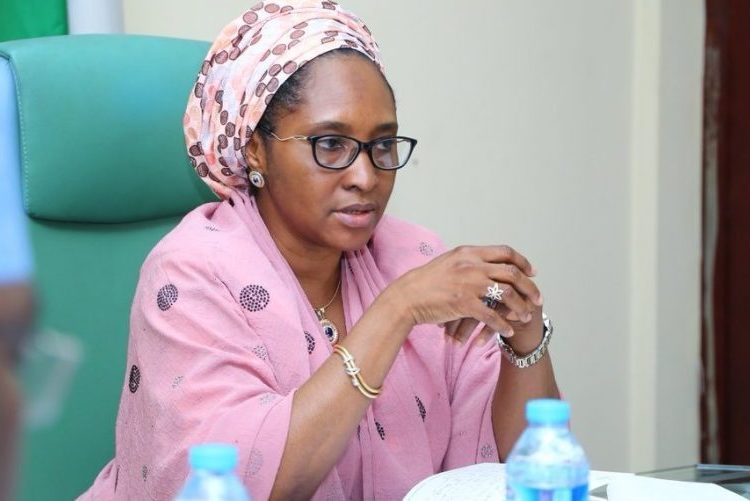Finance and economic experts said the problem confronting the country is a revenue shortfall and management challenge which must be confronted if Nigeria wants to grow economically as a nation and reduce budget deficit.
This is as analysts and stakeholders continue to harp on the government to slow down on its borrowing spree, fearing that with just eight months to go for the President Muhammed Buhari-led government to pass the baton on to its successor, the new administration may be inheriting a debt burden of close to N80 trillion, LEADERSHIP learnt.
Earlier, the federal government had proposed N19.76 trillion with a deficit of N11.3 trillion. This was earlier disclosed by minister of Finance, Budget and National Planning, Dr Zainab Ahmed, during a sitting of the House of Representatives Committee on Finance on the 2023-2025 Medium-Term Expenditure Framework, last week. The minister, then, added that, the federal government expects a revenue of N8.46 trillion for 2023.
To this end, the experts who expressed their misgivings about the appalling state of the economy through Leadership Twitter Space, at the weekend, noted that, it is nothing of prestige for a country like Nigeria already planning to borrow N11.3 trillion to augment its 2023 national budget, calling for efficiency in revenue deployment and management.
To them, the problem is not about the Nigeria’s debt that has risen to about N41trillion, but how those borrowed funds are effectively deployed to ensure that they directly or indirectly regenerate the value.
On his part, the founder, Cowry Asset Management Limited, Mr. Johnson Chukwu, believes Nigeria clearly has severe revenue shortfall because the country is not generating enough revenue and operating far below its potentials.
“We are currently producing less than 1.5 million barrels of crude. We had done close to 3 million barrels a day at some points when we were the fifth largest producer in the world. Today, we are number 15. But beyond that, are we really getting value for money? I also think we are not optimising the little resources we have. When you talk about management, you look at how we spend the little money we have. Are we privatising appropriately? And even with the privatisation, are we getting the best value for every naira we declare in the public sector?” he queried.
With lack of efficiency in revenue deployment, he said, there is bound to be revenue management problem because the economy is not getting value.
To him, “I do not think we are doing that, so, when you don’t have efficiency in your revenue deployment, you are going to have a revenue management problem because you are not getting value. So, you end up acquiring resources for bogus amounts, or inflated amounts and also end up spending money on things you don’t need. Those are the two aspects of revenue management weakness.
“There is a challenge in prioritising the most critical expenditures and spending on those most critical expenditures, as getting value for the amount of money we spend on even those items were identified as important. So, for me, Nigeria is suffering both the issue of revenue shortfall and revenue management challenges.”
On debt servicing problem, he said: “you know, we have to recognise that debt service is derived from debt obligations.
mentioned that we have about N41 trillion in debt, slightly more than $100 billion of much of national debt. So, your revenue service obligation will be two functions the size of your debt, and the cost of your debt. Hence, if you have borrowed massively, even if the cost is high, or not high, you are still going to have some level of revenue of debt service pressure.
“We have GDP that is less than N500 trillion, but the problem is not just your total debt to GDP, but the country have a serious revenue challenge. The country revenue is weak and if you look at what we have achieved so far this year, the government is planning to borrow about N11 trillion next year and at the same time, it is planning to spend more than N19 trillion as expenditure, hence, you are planning to borrow N11 trillion that is projected and we know we will never achieve the revenue projection.
“So, when you consider that you have a revenue challenge and you are incurring what you call non discretionary expenditure, so, it becomes priority charge on your revenue and when you get to a point where your debt service becomes higher than the revenue you are generating, you are really pushing yourself into a difficult situation.”
He urged government to slow down on accumulation of debt and cut down on government expenses while growing the nation’s revenue base further.
“We need to cut down on government expenditure and we also need to grow the revenue. So, both are critical in slowing it down because If you grow your revenue, you don’t need to borrow to meet your obligations. Conversely, cut down on expenditure, it will help you reduce your borrowing.
“Today, we have negative taxation and subsidy is considered negative tax but today, we are talking about subsidy payment of about N6.5 trillion and that is an expenditure. So, that’s one area that government can look at because, if we cut down on that, it means that the government obligation to spend will be reduced by that N6.5 trillion,” he pointed out.
A certified accountant and analyst, Mr Ahmed Abdulfathi Usman, on his part, thinks the revenue Nigeria is generating does not reflect what it is spending, adding that, “we are proposing a budget of almost N19 trillion in 2023 budget and we are expecting a budget deficit of almost N11.9 trillion . The question here is that, if the government is channelling all or if we have what we call a proper budget implementation.
“So, if Nigerian government want to achieve a viable economy, a sound revenue base is critical. Then, we also need to cut expenditure and we need to ensure proper implementation of budget. Without these, the implication will become very worrisome as we are seeing right now in the country where the dollar is now almost 710.”
On leasing out government assets to generate revenue, Ahmed said, it a wise decision for the government to push in that direction and that, one major aspect he is worried about is the debt accumulation.
“ If you look at the rate we keep borrowing both at the national and domestic levels, if the government want to expand their revenue generation, they can look at leasing assets as we have untapped assets in the country that needed to be tapped.
“We have so many resources on the ground and if you want to have a sound economy, you need to put the banks in order, provide commercial banks with loans for on-lending to upcoming businesses, put tax in place, you need to put as many aspects of revenue generation. So, if the government want to push into that aspect, it will be a very nice idea for the government to do that.
As part of a measure to reduce over-bloated budget, look into personnel, overhead, and capital expenditure and address the anomaly,” he pointed out.
Looking at the way government is spending the budget both at the state and federal levels, he said: “we need to put proper regulations. We need to regulate the spending, cut some overhead and cut some personnel costs. In general, we need to cut government expenditure both at the state and federal levels.”
The minister of Finance, Dr. Zainab Ahmed, earlier last week, while giving a breakdown of the revenue, stated that, government was projecting revenue of N8.46 trillion for 2023. She added that, N1.9 trillion would come from oil-related sources while the balance would come from non-oil sources.
She added that the budget would be premised on $70 per barrel of crude oil and an exchange rate of N435.57 to the dollar, citing that oil production for 2023 was pegged at 1.69 million barrel per day; a real GDP growth rate of 3.7 per cent and inflation rate of 17.16 per cent for the year.
The minister also stated that petrol subsidy would remain up to mid-2023 sequel to the 18-month extension announced early in 2021 and that N3.36 trillion would be provided to pay the subsidy in 2023.
Meanwhile, with a current debt stock of N41.6 trillion as at March this year, a Ways and Means borrowing of over N19.9 trillion, FGN Bonds worth over N5.1 trillion issued since April and a projected deficit of over N11 trillion to finance the budget of 2023, the country is already looking at a debt burden of over N77.6 trillion. This excludes the bonds that would still be raised before 2022 runs out.
Already the country is at risk of borrowing to pay interests on its debt obligations as the minister of Finance, Budget and National Planning, Mrs. Zainab Ahmed had sounded the alarm bells when she revealed that the country’s debt service cost in the first four months of the year was N1.94 trillion, N310 billion higher than the actual revenue received during the period.
According to her, federal government’s retained revenue for the period was only N1.63 trillion, 49 per cent of the pro rata target of N3.32 trillion. This means that the government had spent 118 per cent of its revenue on servicing its debt. Irrespective of this, the minster, while presenting the 2023-2025 Medium Term Expenditure Framework (MTEF) and Fiscal Strategy Paper (FSP), had disclosed that the federal government will borrow over N11 trillion and sell national assets to finance the budget deficit in 2023.
She also said the government’s budget deficit is expected to exceed N12.42 trillion if it should keep the petroleum subsidy for the entire 2023 fiscal cycle. She explained that the first option involves retaining the petroleum subsidy for the entire 2023 fiscal year.
Ahmed said in the first scenario, the deficit is projected to be N12.41 trillion in 2023, up from N7.35 trillion budgeted in 2022, representing 196 per cent of total revenue or 5.50 per cent of the estimated GDP. In this option, she added, the government would spend N6.72 trillion on subsidy. She furthered that the second option involves keeping the subsidy till June 2023 and that this scenario will take the deficit to N11.30 trillion, which is 5.01 per cent of the estimated GDP. In this option, the PMS subsidy is projected to gulp N3.3 trillion.
A member of the Monetary Policy CommitteeMPC), Professor Mike Obadan, called for the rationalisation of the structure of spending, especially of non-capital expenditure items to eliminate wastes and minimise the need for ways and means advances and debt accumulation, even as the quality of public expenditure needs to improve significantly to enhance the output-capital ratio.
Speaking on the legacy of debt, renowned economist and former director general of the West African Institute of Financial and Economic Management, Prof. Akpan Ekpo, stressed the need for the government to put ‘cap on its borrowings’ at the moment.
Noting that there is nothing wrong in borrowing provided it is to finance hard infrastructure that has a long term positive effect, he stated that, “the problem with Nigerian borrowing is that there is not much transparency we don’t know what they are borrowing for.
“Also important is the fact that debt service is too high. if you look at every budget virtually almost one tenth is used to service debt and we have not even started touching the debt. So, we have to be cautious. The government will argue that debt to GDP allows them room to borrow but GDP does not pay debt, revenue pays debt and if you take revenue to debt ratio, we cant even borrow at all because two third of revenue comes from oil and the revenue from oil is not a sure revenue.
“I don’t envy any government coming in. Debt is a problem on one side and other problems on the other side. And more importantly, these debts will be paid by the future generation. If we are not careful the future generations will abuse us in our graves because they will see the debt and not see what it was used for. No good roads, no good railways, no water, education is in disarray, health system exposed by the Covid-19 is in trouble. Time flies and in no time 20 years have passed and we are still servicing the debts. We should not borrow because we have space to borrow or because we have B+ ratings by rating agencies. They are getting us more and more indebted.”





